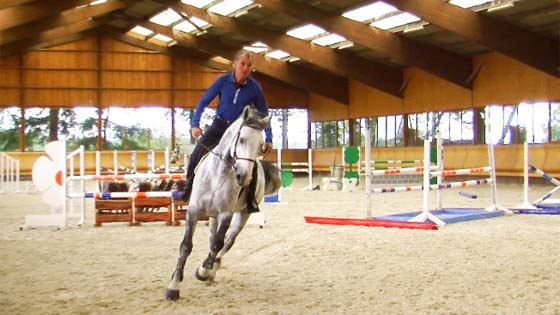Caring for and improving the horse’s top line motion : video 3

How to strengthen the horse’s back and get him ready for the jumping session to follow by riding with the correct mental and physical attitude with the essential exercises to practice.
Michel rides Day Dreamer for the first time, and as it’s his practice when a new horse joins the yard, he starts by assessing the horse. Michel finds out the weaknesses and strengths of the horse by paying attention to the horse’s reactions when he varies his position. It will enable him to set some training goals. Regarding Day Dreamer, like the majority of horses, his weakness is some sensitivity in the withers and underneath the saddle. Michel explains the mind and body attitude to take on, in order to allow Day Dreamer to improve the motion of his top-line which will in turn release the points that are blocking the flow of energy.
Bringing a particular attention to the horses’ back has always been a priority for Michel. No exercise can be beneficial and successful if the horse moves in a wrong attitude. If the horse doesn’t use his back correctly, it’s illusive to expect him to be in self-carriage and to engage his rear legs. The rider’s priority should be to stretch the horse’s entire top line in order to improve the driving forces and to allow the energy to flow through as freely as possible, from the rear-end to the mouth with no blockages.
The favourable position for a work-out under saddle consists of rounding the horse’s back up to favour the opening of the vertebras and the correct joint motion.
Only in this condition, it becomes possible to talk about engagement and self-carriage. In this regard, Michel has to work with a seat as light as possible to allow Day Dreamer to move his body with freedom. Michel maintains this position the entire session, especially when he works on getting the horse to lift his back up under the saddle particularly during the rein-backs and transitions.
To remember:
- Caring for the horse’s back must be an absolute priority. “No back, no horse”
- Beware of your horse’s reactions to detect eventual soreness or blockage in the flow of energy.
- At the end of an exercise, if you let go off your reins and the horse stretches down, it means that he loosens up the correct way. On the other hand, if he opens up and lifts up his neck, it shows some soreness, blockage of energy, or some misunderstanding.
